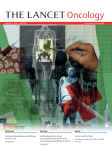Lancet Oncology:癌症引起患者家属的焦虑情况则远胜于患者本人
2013-06-06 Lancet Oncology dxy
疾病给患者带来了痛苦和恐惧,随之而来的还有不安。最新发表在Lancet Oncology上的一项研究给了我们一个更加客观和深刻的结论:癌症不仅会引起抑郁倾向,还有焦虑,像梦靥一样地笼罩着他们。更出乎意料的是,患者家属的焦虑情况似乎更为严重)。研究在线发表在6月5日The Lancet Oncology上。 2020年,全球每年的新诊癌症将会达2100万例。而随着医疗技术的进步,患者的生存率正在逐
疾病给患者带来了痛苦和恐惧,随之而来的还有不安。最新发表在Lancet Oncology上的一项研究给了我们一个更加客观和深刻的结论:癌症不仅会引起抑郁倾向,还有焦虑,像梦靥一样地笼罩着他们。更出乎意料的是,患者家属的焦虑情况似乎更为严重)。研究在线发表在6月5日The Lancet Oncology上。
2020年,全球每年的新诊癌症将会达2100万例。而随着医疗技术的进步,患者的生存率正在逐年提高,目前70%的患者都能达到5年生存以上。而癌症患者以及患者家属的心理健康问题,似乎从未引起过足够的关注。过去的一些研究表明,癌症确诊后患者及亲人的确会出现一些忧郁症状,但似乎随着时间的过去,情况会出现好转。The Lancet Oncology上发表的这项研究荟萃分析和系统性回顾了发表在27本期刊,共涉及500000人的43项研究。进一步证实,在癌症确诊之后2年,患者本人和家属都不会表现出更高的抑郁症倾向,但焦虑却会一直存在,甚至延续至确诊后的10年。
研究数据显示,确诊两年后,抑郁在研究人群中发病率在患者和非癌症患者之间无统计学差异(11.6% vs 10.2%)。而焦虑情况在癌症患者组内更为常见(17.9% vs 13.9%)。在对比癌症患者和其家属的心理健康时可以发现,患者家属的焦虑情况则远远高于患者本人(40.1% vs 28.0%)。
英国的Mitchell医生是这一结论的主要研究者,他认为,“自结束治疗走出医院后,患者通常只会进行阶段性的复查。尤其在两次复诊的间期,患者和其家属会极易产生对疾病的深深忧虑。另外,目前针对身体恢复和心理上的辅助治疗还未形成系统。所以未来,我们应该花更多一些的精力在癌症患者还有家属们的愈后心理诊断和支持治疗上。”

Depression and anxiety in long-term cancer survivors compared with spouses and healthy controls: a systematic review and meta-analysis
Background
Cancer survival has improved in the past 20 years, affecting the long-term risk of mood disorders. We assessed whether depression and anxiety are more common in long-term survivors of cancer compared with their spouses and with healthy controls.
Methods
We systematically searched Medline, PsycINFO, Embase, Science Direct, Ingenta Select, Ovid, and Wiley Interscience for reports about the prevalence of mood disorders in patients diagnosed with cancer at least 2 years previously. We also searched the records of the International Psycho-oncology Society and for reports that cited relevant references. Three investigators independently extracted primary data. We did a random-effects meta-analysis of the prevalences of depression and anxiety in cancer patients compared with spouses and healthy controls.
Findings
Our search returned 144 results, 43 were included in the main analysis: for comparisons with healthy controls, 16 assessed depression and ten assessed anxiety; of the comparisons with spouses, 12 assessed depression and five assessed anxiety. The prevalence of depression was 11·6% (95% CI 7·7—16·2) in the pooled sample of 51 381 cancer survivors and 10·2% (8·0—12·6) in 217 630 healthy controls (pooled relative risk [RR] 1·11, 95% CI 0·96—1·27; p=0·17). The prevalence of anxiety was 17·9% (95% CI 12·8—23·6) in 48 964 cancer survivors and 13·9% (9·8—18·5) in 226 467 healthy controls (RR 1·27, 95% CI 1·08—1·50; p=0·0039). Neither the prevalence of depression (26·7% vs 26·3%; RR 1·01, 95% CI 0·86—1·20; p=0·88) nor the prevalence of anxiety (28·0% vs 40·1%; RR 0·71, 95% CI 0·44—1·14; p=0·16) differed significantly between cancer patients and their spouses.
Interpretation
Our findings suggest that anxiety, rather than depression, is most likely to be a problem in long-term cancer survivors and spouses compared with healthy controls. Efforts should be made to improve recognition and treatment of anxiety in long-term cancer survivors and their spouses.
本网站所有内容来源注明为“梅斯医学”或“MedSci原创”的文字、图片和音视频资料,版权均属于梅斯医学所有。非经授权,任何媒体、网站或个人不得转载,授权转载时须注明来源为“梅斯医学”。其它来源的文章系转载文章,或“梅斯号”自媒体发布的文章,仅系出于传递更多信息之目的,本站仅负责审核内容合规,其内容不代表本站立场,本站不负责内容的准确性和版权。如果存在侵权、或不希望被转载的媒体或个人可与我们联系,我们将立即进行删除处理。
在此留言









#患者家属#
0
#Lancet#
72
#Oncol#
76
#Oncology#
77